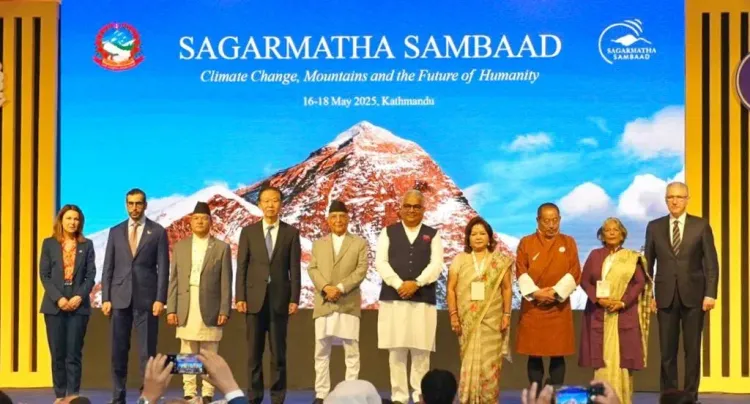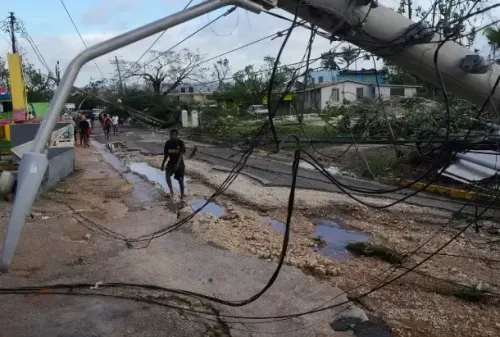Is India Committed to Global Climate Action to Safeguard the Himalayas?

Synopsis
Key Takeaways
- India's commitment to global climate action is unwavering.
- The Himalayas are vital ecosystems that require protection.
- Collaboration among nations is essential for effective climate initiatives.
- South Asia contributes minimally to historical CO₂ emissions.
- The International Big Cats Alliance aims to enhance conservation efforts.
Kathmandu, May 16 (NationPress) Union Minister for Environment, Forest and Climate Change, Bhupender Yadav emphasized India's steadfast commitment to international climate initiatives and the necessity for joint efforts to protect the Himalayas and other mountain ecosystems during the opening session of 'Sagarmatha Sambaad' held in Nepal's capital, Kathmandu, on Friday.
The high-level global dialogue took place under the theme of 'Climate Change, Mountains, and the Future of Humanity', featuring participation from ministers and climate leaders from various countries.
"The Himalayas carry a significant portion of the environmental crisis burden. In India, where we have considerable Himalayan territory, we experience these impacts directly. India resonates with the concerns of the mountain states and their inhabitants. Our environmental futures are interconnected. Under the leadership of Prime Minister Narendra Modi, India is committed to addressing climate action with the urgency it necessitates, despite our minor contribution to the crisis," Yadav shared on X following the session.
A number of international dignitaries, including Prime Minister of Nepal K P Sharma Oli, Foreign Minister Arzu Rana Deuba, Vice Chairman of China's National People's Congress Xiao Jie, and COP29 President and Azerbaijan's Ecology Minister Mukhtar Babayev, attended the session.
"It is a great honor to represent India at this pivotal gathering. The term Sagarmatha, meaning 'Head of the Sky', perfectly encapsulates the grandeur and responsibility we hold in safeguarding the mountains that are integral to our planet's lifeblood," Yadav stated.
He acknowledged Nepal for hosting the 'Sambaad' and asserted that India, with its extensive Himalayan region, shares a mutual ecological and cultural connection with its mountain neighbors. He highlighted that South Asia contributes only four percent of historical global CO₂ emissions, even though it is home to nearly 25 percent of the world's population.
The Minister underscored that the burden of the climate crisis is disproportionately shouldered by developing nations, while developed countries fall short of meeting their climate finance, technology transfer, and capacity-building obligations.
Yadav pointed out the immense biodiversity significance of high-altitude ecosystems, such as those in India and Nepal. He called for improved transboundary conservation initiatives, urging all Himalayan nations to collaborate through the International Big Cats Alliance to support joint protection projects for species like snow leopards, tigers, and leopards.
"The Alliance seeks to enhance conservation expertise, fund vital initiatives, and establish a knowledge repository for the protection of these iconic species," he mentioned during his speech.
"At the 13th CoP to the Convention on Migratory Species in February 2020, Prime Minister Narendra Modi emphasized the importance of protecting the snow leopard and its habitat in the upper Himalayas. In line with this vision, India has conducted its first comprehensive Snow Leopard Population Assessment, which, conducted between 2019 and 2023, identified a total of 718 snow leopards across India, constituting about 10-15 percent of the global population," Yadav added while reflecting on the importance of Project Snow Leopard initiated by PM Modi.
"India is prepared to partner with Nepal and all mountain nations to safeguard our shared ecological heritage. In the spirit of Vasudhaiva Kutumbakam — the world is one family — we must ensure that our sacred mountains continue to stand tall as symbols of hope and sustainability," Yadav concluded.
After the session, Yadav met with Nepal PM Oli on the sidelines of the 'Sagarmatha Sambaad' event.
"I conveyed India's gratitude for organizing the Sagarmatha Sambaad to discuss ‘Climate Change, Mountains, and the Future of Humanity’. Both parties expressed a desire to strengthen ties in areas of clean energy, biodiversity conservation, and the safeguarding of our natural resources. I appreciated the wonderful hospitality of the Nepali people," he remarked after meeting Oli.
Later, Yadav also conferred with Arzu Rana Deuba, the Minister of Foreign Affairs of Nepal.
"A productive meeting with Bhupender Yadav, India's Minister of Environment, Forest and Climate Change. We reviewed the extensive Nepal-India relations. Given India's position as a climate leader, we value H.E. Yadav's significant insights at the Sagarmatha Sambaad," Deuba noted on X following the meeting.








